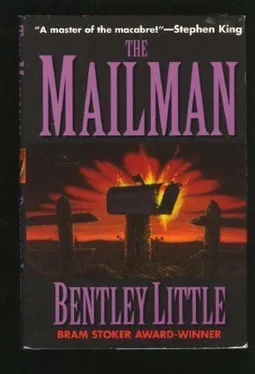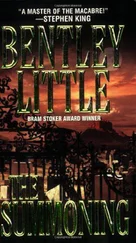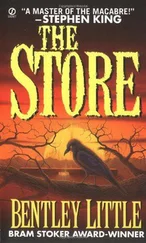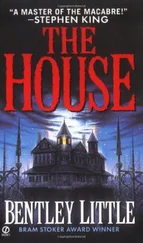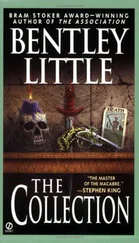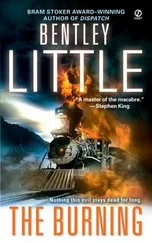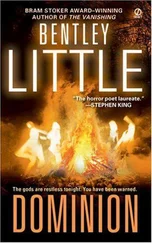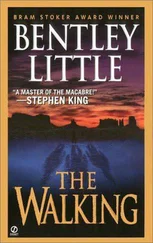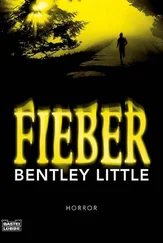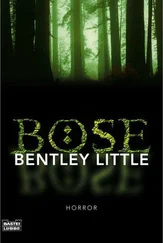"We just found the chiefs body a few minutes ago," Mike said. "How's your son? Is he going to be okay?"
"We don't know."
"We're gathering everyone together. We'll be leaving in ten minutes."
"Wait a sec, Mike." Doug felt weak. He saw Tritia running down the hall toward him, nearly tripping on the slippery tile. She was crying, sobbing, and with a sinking feeling in his stomach he knew that Billy was dead. Then she drew closer, and he saw that she was crying and laughing, sobbing and smiling.
"He's okay," she cried. "He's all right."
"Hold on, Mike," Doug said into the receiver. He left the phone dangling as he took Tritia 's hand and ran down the corridor to the examination room. The doctor was just maneuvering the largecranelike X-ray machine over Billy's back.
"Is he okay?" Doug asked.
"There's been no real physical damage," the doctor told him. "Billy is clearly suffering from traumatic shock, but he seems to have sustained no actual injuries. There're a few scratches and bruises, and I'll continue the tests, but I think you're safe."
"He wasn't . . . ?" Doug left the question unfinished.
"There does not appear to have been any penetration," the doctor said quietly, "although I have no doubt that he was assaulted."
"But the blood on his underwear . . . ?"
"It's not Billy's blood."
A flood of relief washed over Doug, and he held Tritia , who continued to sob. The doctor gave him a quick reassuring smile, then moved the X-ray camera into place.
Five minutes later, Doug was back in the waiting room. He picked up the receiver. "Mike? You still there?"
The other end of the line was silent. "Mike!" He heard a low knock as someone obviously picked up the phone from where it had been lying. "Mike?"
"Yeah?"
"He's okay."
"Thank God."
"I want to be in on this," Doug said.
"I can't --"
"Mike?"
Silence.
"Mike?"
"All right," the policeman conceded. "How fast can you get over here to the station?"
"I'll be there as soon as I can. Wait for me."
"Make it fast. We want to get him before he leaves town. You have five minutes."
"Goddammit!"
"All right," the policeman said. "Sorry. We'll wait."
"Thank you. I'll be there in ten."
"Meet you here." Mike hung up and Doug did the same. He returned to the examination room, where the doctor was putting away a hypodermic syringe. One of the nurses covered Billy with a sheet. "Get him a room," the doctor ordered. He looked from Doug to Tritia . "He'll be sleeping for a while now. I suggest you try to get some rest. He'll be coming out of it before morning, and he's going to want you nearby."
"I'm staying," Tritia said.
The doctor nodded. "We can set up a chair in his room. Or even a cot, if you'd like."
Tritia looked up at Doug, who put his arms around her. "Have they caught him?" He shook his head. "We're going after him now."
"'We?' "
"We."
The doctor, orderly, and nurses worked busily next to Billy.
Doug squeezed Tritia tightly. "Watch him," he said. "Take care of him."
She shivered as he pulled away, rubbing her arms. "Where are you going?
What are you going to do?"
"I'll meet them at the police station. Then we'll go to the post office."
They both followed the hospital team as they wheeled the now sleeping and silent Billy into his room, a large private room witha.raised color television and two adjoining beds. Doug gave Tritia the pertinent insurance information from his wallet, and she promised to take care of everything.
She followed him out to the waiting room. "Be careful!" she called after him as he walked between the sliding glass doors.
45
Doug ran into the police station. He noticed the difference immediately.
No one was working or talking. The room was still and silent. The policemen were standing around the front office, visibly nervous, unsure of what to do. Mike seemed to have taken charge, though there were one or two officers above him in rank, and he alone appeared to be thinking clearly and rationally. He was on the phone, apparently talking to someone important in Phoenix.
There were piles of unopened letters on each of the desks, Doug noticed.
The letters were untouched, as if everyone was afraid to go near them.
Mike got off the phone, saw Doug, and hurried over. "Finally," he said.
"How's your boy?"
Doug nodded. "He'll be okay."
"Your wife?"
"All right."
"Good." He was holding a letter in his hand, and he handed it to Doug.
"Read this."
Doug looked down at the paper. Scrawled in smeared pencil was a simple sentence:
Your services are no longer needed.
It was not dated, it was not signed.
"We found this in the chiefs hand."
"Where -- ?" Doug began.
"Come on." Mike led him quickly into the hall and down to the closed office at the far end. "Brace yourself." He opened the door.
Catfieldwas in his desk chair, facing the door. He had been thrown back against the wall behind the desk and was staring at them. Or would have been staring at them had he had a face. For the shotgun proppedori the desk before him had taken off half of his head, including his nose and eyes, leaving only a twisted bloody mess of bone and tissue. Five or six remaining teeth grinned out of the grotesquely misshapen hole that had been a mouth. The diplomas and certificates on the wall were splattered with a Rorschach of blood and brains.
"Jesus," Doug breathed. He looked at Mike. "You waited to call me?"
"No," the policeman admitted. "But I didn't want to argue. We went over to the post office, found nothing. I have five men and six volunteers combing the town right now."
"Have you tried Howard's house? That's where he lives."
"That's where the rest of us are going."
"Let's go,'" Doug said. He closed the door to the chiefs office.
The mailman's car was not in front of Howard's house, but the convoy of two police cars and two pickups parked catty-corner in the center of the street just in case, effectively blocking off any attempt to escape. The house looked even worse than it had the last time Doug had been by. The paint wasn't peeling, the shingles not falling off, but the house's overall appearance was so dilapidated that it gave the illusion that they were. The lawn was a brown weed jungle.
They got out of their cars and moved forward, two policemen in the lead, guns drawn. No one came out of any of the other houses on the street, and Doug found himself wondering if their owners had left, were dead, or were merely too frightened to come out.
A policeman knocked on the door, rang the bell, called out for someone to answer, then used a device tojim open the door. They walked inside.
The interior of the house was completely dark, the only illumination entering through the open door behind them. The heavy unmoving air stank of festering decay. Doug put his hand over his nose to block out the smell. He looked around, frowning. The entryway seemed narrower than he remembered, the walls rougher and more irregular. He reached out to touch the wall next to him, and his fingers touched packed paper. "Jesus," he whispered.
Stacks of envelopes stretched from floor to ceiling, covering every available inch of wall space, completely blocking the windows. The envelopes were fitted so neatly and precisely together that there was no space between them; they effectively formed an inner wall to the house.
The rest of them waited in place while two policemen went out to their cars for flashlights. Doug's eyes gradually adjusted. He could see into the living room beyond, and he noticed that the furniture had remained untouched.
The couches and tables were not covered by mail, but the walls were concealed with an inner layer of piled envelopes, and in the center of the room additional stacks of mail had been used to form low shapes, sculptures, vaguely geometric, vaguelypyramidic forms.
Читать дальше
